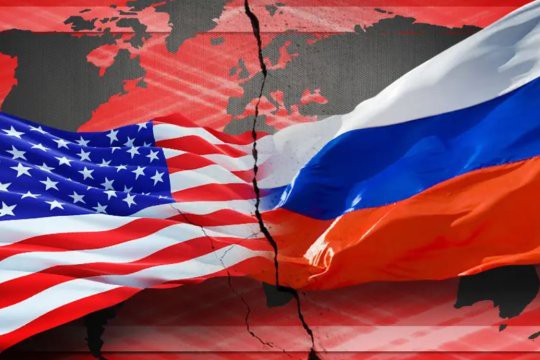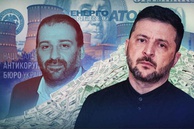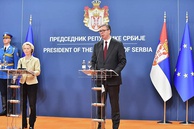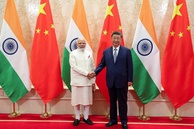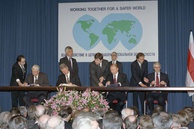THE open confrontation between Russia and the West that had begun in 2014 reached a new level after February 24, 2022. It became a “hybrid” yet full-scale and bloody war waged by the West against us by the hands of the regime in Kiev.1 The West responded to the Special Military Operation (SMO) with unexpected aggression. More economic sanctions, harsh political pressure, and another bullying campaign in the Western media could have been expected, but not the freezing of gold and foreign exchange reserves of the Russian Central Bank and not massive supplies of lethal weapons to Kiev.
This was not spontaneous improvisation; everything had been planned well in advance. The 2014 coup d’état in Ukraine had been stirred up to prepare Ukraine for a big war with Russia. The first three, most painful, packages of anti-Russian sanctions had been prepared in advance and were adopted by the EU on the eve and during the first three days of the SMO.
From Geopolitical Confrontation to a Hybrid War
MAJOR miscalculations in military-political planning and analysis became apparent in the first weeks of the SMO. The failure of the initial plan of the SMO cardinally changed the goals and tactics of the West. It had expected to play the long game – to wear Russia down on the outer contour while consistently undermining and shattering it within its borders in order to gather fruits in the “post-Putin” era. Having smelled our blood, the West went all-in. Masks were removed to reveal the true faces of our false partners. They were determined to inflict a strategic defeat on Russia by achieving “victory on the battlefield” with the help of the latest NATO weapons. Military defeat was to be followed by an economic collapse caused by unprecedented sanctions. President Putin was to be replaced by a comprador regime taking orders from the West. The united West has in effect declared war on Russia – a war of destruction without rules and borders waged on all accessible platforms. The end goal is to dismember Russia, appropriate its resources, and liquidate Russia as a state and civilization.
Russia, having launched the SMO, broke the mold of the world order in which it was to play the role of the eternally vanquished side in the Cold War and defended its right to security and national dignity. In fact, in the case of NATO membership for Ukraine, conceived as a “triumph of will” by Washington and Brussels, the US relied on past precedents when Moscow was forced to accept without a murmur wave after wave of NATO expansion. This time, Moscow gave a decisive rebuff.
At the same time, the new level of confrontation between Russia and the West is asymmetrical. The US-led NATO+ coalition is fighting against Russia, while Russia does not confront the West outside the SMO zone. It has not introduced countersanctions and even continues to sell the West strategically important materials: gas, oil, and mineral fertilizers to the EU, and titanium and uranium to the US (deliveries of the latter doubled in 2023). In Russia, practically no assets of foreign companies and physical persons or shares of Russian companies belonging to foreigners have been confiscated or arrested; Russia continues paying its debts to unfriendly countries; and the outflow of capital from Russia continues (in 2022, it reached a record $243 billion).2
The self-imposed informal limits that Russia has evidently put on itself in the course of the SMO are part of its “asymmetric peacefulness.” Zelensky and practically all members of the ruling Ukrainian elite enjoy undeclared immunity, which they did not expect to receive. They know that there is no danger, that their lives and personal wellbeing as well as certain strategic infrastructure and “decision-making centers” in Kiev are not endangered. The question is: Why don’t we bomb government offices, liquidate their intelligence services, or engage in sabotage and diversion? We all know that terrorism can be defeated only when the heads of terrorist groups are liquidated.
Russia has not abandoned its previous strategy toward the West that it has consistently implemented after 2014 (in a wider sense, after 1991), focused on not burning bridges or exacerbating disagreements beyond reasonable limits while always leaving room for compromise. Russia implemented this policy for many years while unilaterally complying with the Minsk agreements, but this just led to an unjustified delay in resolving the Ukraine problem. Dmitry Medvedev, deputy chair of the Russian Security Council, commented: “While supporting the Minsk process in words, the NATO countries shamelessly used the time thus obtained to supply Kiev with arms and armaments to prepare it for wide-scale aggression.”3 The anatomy of Minsk-1 and Minsk-2 will be carefully studied sometime later. But today we can recall what Belarusian President Alexander Lukashenko recently said: “Probably our only mistake is that we did not resolve the problem in 2014-2015, when Ukraine had no army and was not ready to fight.… Everyone wanted to somehow settle the problem peacefully, but during this time they were building up battleworthy armed forces.”4
Russia remained Kiev’s biggest trade partner until the beginning of the SMO. So long as the slightest hope remained of avoiding major bloodshed, Russia focused every effort on achieving that goal, which explains why the demilitarization and denazification surgery began too late and why it turned out to be painful and bloody. “In fact, the Cold War developed into a hot war because we waited far too long. We should have acted in 2018-2019,” said Sergey Karaganov. “But we were waiting for something. Perhaps we were gathering strength. We probably failed to appreciate the depth of our disagreements. Perhaps we were hoping to reach an agreement. Some people wanted to preserve their capital or positions in the West. Had we started earlier, perhaps we could have avoided an open and large-scale armed conflict.… We lost too much time pacifying, hoping, trusting.”5 This creates the impression that today, in the course of the SMO, we are waging truncated and softened warfare in hopes of achieving some agreements (similar to the failed Istanbul agreement discussed in March 2022) and that Russia is limiting its military activity under the pressure of “behind the scene” agreements that are obviously not being fulfilled.
In the context of the SMO, it has become obvious that the post-Soviet strategy of integrating Russia into the Western world failed. Andrey Ilnitsky, adviser to the Russian defense minister, said the following on that score: “The wider we opened up to the West and were ready to meet our Western ‘partners’ halfway, the greater was their desire to take advantage of this; they pushed our interests aside. Hopes of integration with the West as a sovereign great power were never realized and were counterproductive in many respects.”6 Speaking at the 31st Assembly of the Council on Foreign and Defense Policy, Russian Foreign Minister Sergey Lavrov said: “Understandably, the Western ‘track’ in our foreign policy as it had been developed until recently is no longer viable. We are now at the point of fierce confrontation with an aggressive bloc composed of the US, the EU, and NATO.… The Western expert community is openly discussing an ‘order’ that they have received for Russian partition scenarios.”7 Russia’s existence as an independent center is incompatible with the West’s goal of attaining global domination, he added.
Even if most of our administrative elites and business and expert communities inspired by enthusiastic or ideologically substantiated Westernization are probably aware of the war being waged against Russia, they cannot take this to heart as part of everyday reality. They still hope appeasement is possible; they hope to revive the past; they still hope that the conflict can be “frozen”; they believe that “peace, no matter how bad,” with those whom we for 30 years persistently called partners is possible; they think we should demonstrate patience until certain international events take place, such as the 2024 presidential election in the US, after which we would be offered a peace agreement (even if a denigrating one).
According to a public opinion poll carried out at the St. Petersburg International Economic Forum by the All-Russian Center for the Study of Public Opinion and the Roscongress Foundation in June 2013, 30.4% of those who represented the business and scientific communities and government bodies of Russia were convinced that their country should make every effort to get the sanctions removed. Only 37.7% of those polled approved of the sovereign economic policy.8 This means that there are many who refuse to accept the truth that our enemies are determined to go to the end; they try to “break through” to the West; they hope that Russia would be reconnected to “progressive mankind.” These members of our political class and business circles are vulgar economists who think that money can solve any problem. They look at war through a commercial lens and view Zelensky and his regime as a recalcitrant business partner rather than an ideological enemy.
In any case, the “asymmetry of peacefulness” initially implemented to gain the time needed to build up the armed forces and put the Russian economy on a war footing was exhausted when the SMO turned from a police operation into a full-scale war. Our predictability and desire to preserve our reputation as a “reliable partner” who “sticks to the rules of the game” that others ignore are probably good and proper in peacetime but obviously out of place in wartime. They are perceived in Ukraine and the West as our weakness and loss of face. Convinced of their impunity, our enemies are stoking the confrontation. Determined that we would never cross certain red lines and incur retaliation, the US administration does not hesitate to supply Ukraine with increasingly lethal weapons. This unilateral escalation will continue until our enemies perceive a real military threat to their existence.
We must change our policy to get out of the corridor of American scenarios. We must abandon the illusion that compromises are possible; this only protracts the SMO and causes more suffering and death. We must demonstrate firmer resolve and more determination beyond Ukrainian borders, in places where we can impair the West. We must be ready to escalate according to the quid pro quo principle. We rely on the wrong conviction that the foreign policy of our former and crafty Western partners is by default pragmatic and rational. In reality, it is ideologized and Russophobic. Their hatred of Russians and historical Russia is absolutely irrational. As a result, the economic development of the EU and its member countries fell victim to politics and ideology (Germany is an especially vivid case in point). Europe abandoned its main competitive advantage: reliable supplies of cheap Russian fuels. As could be expected, it is gradually losing its industry. There is no rational explanation of this “greatest enigma of the 21st century.”9
Existential Meanings of the Confrontation
THE degree of Western maliciousness was underestimated largely due to the illusion that with the collapse of the USSR, the West and post- Soviet Russia would no longer have any ideological antagonism and their relations would be harmonious, conflict-free, and based on the principles of democracy and the free market. In fact, ideological differences became obvious in the 1990s, albeit in different forms and different hypostases. The West gradually acquired a new post-Cold War totalitarianism that departed radically from Christianity, morality, and culture: an Orwellian lie and unnatural deadly sins touted as a “new normal” together with neocolonialism and a foreign policy of geopolitical racism.
American and European leaders interpreted the armed conflict in Ukraine as a chance to liquidate Russia as an alternative civilization with its own ideas about the world, God, and humanity. The conflict is over more than just Ukraine; it is primarily over existential meanings and values. It is unfolding amid an unprecedentedly radical anthropological revolution in the West that encroaches on human nature with the aim of changing it. “Gender diversity” as the slogan of the day is intended to revise the division of the human species into two genders that have existed since Adam and Eve, to destroy the family, to legalize perversions that until recently nobody dared talk about out loud, and to create a fundamentally new LGBT civilization that can rightly be given the biblical name of Sodom.
The Communists in their day tried to build a classless society in the Soviet Union. The post-Christian West of our time is building a genderless society. In fact, it is trying to bring to life British science-fiction writer Aldous Huxley’s dystopia that he called a Brave New World (first published in 1932) in which people are not born naturally, there are no marriages, “father” and “mother” are treated as profane words, consumption is elevated to a cult, and people find happiness in hedonistic pleasures.
Some Western countries have already adopted laws that undermine morality (in the 20th century, this happened in the Third Reich). Euro- Atlantic societies treat sodomy as the latest ethical standard, as a desired and not merely accepted behavior model, and its exponents are greeted as the vanguard of humankind. The West aggressively imposes its destructive gender ideology on the rest of the world as a key for exploiting non-Western societies regarded as potential rivals. Prominent historian Archpriest Vladislav Tsypin has written: “This satanic project is being hastily implemented to radically reduce Earth’s population. In the future, procreation will be the privilege of a select few.”10
In the last few centuries, Russia has been deeply involved in European civilization: It utilized all its achievements and suffered all its illnesses in their malignant forms (planting Marxism in Russian soil was malignant enough). The eminent Russian theologian St. Theophan the Recluse of Vysha wrote late in the 19th century: “God punished us and will continue punishing by the West, but we cannot grasp the meaning.… We are charmed by enlightened Europe, this is true. But let us recall 1812. Why did the French come to us? God sent them to exterminate all the evil we had borrowed from them. Russia repented, and God had mercy on it…. It seems that today we are disregarding this lesson. If we come to our senses, nothing will happen. If not, God will probably send us similar teachers to bring us to our senses and show us the road toward reformation.”11 Gender Satanism of the recent kind has already been imposed on Ukraine. This will happen to us if we prove weak. Let me remind you that back in 2017, the Russian Health Ministry quietly issued Order No. 850 that de facto legalized gender change in Russia and instructed “medical organizations … to issue a corresponding document after verifying the gender reorientation.”12
Gender change clinics opened in Moscow and other big cities; an operation cost from 500,000 to 2 million rubles. According to figures quoted by the Ministry of Internal Affairs, between 2016 and 2022, about 3,050 people who had undergone gender reassignment therapy applied for new passports.13 This gender bacchanalia and shameful business were stopped when the SMO began; gender reassignment was banned by a federal law that came into force on July 24, 2023.14
On the whole, the large spiritual gap between Russia and the West that is widening in the context of the fighting in Ukraine is good for Russia, even if the SMO is very painful militarily, politically, socioeconomically, and psychologically. People may say that the anti-family, gender-related agenda is a private rather than political issue. In fact, it is more than politics; it is an irreconcilable philosophical disagreement related to human nature.
Having accepted the ideology of sodomy, the West has taken the path of suicide. It is moving toward the dehumanization of humankind, the ultimate destruction of the institution of the family, a society that has lost its vitality, and a demographic catastrophe. Today, what George Kennan said in 1947 about the Soviet system can be applied to the West: “But the possibility remains (and in the opinion of this writer it is a strong one) that these societies, like the capitalist world of its conception, bears within it the seeds of its own decay, and that the sprouting of these seeds is well advanced.”15 Normalized relations between Russia and the West in the spiritual realm – the realm of ideas and concepts – is possible only if the West abandons its aggressive Russophobia and transhumanism (although this is apparently impossible in some countries that have already passed the point of no return). In all other cases, no matter how the Ukraine crisis is resolved, the US and the EU will never leave Russia alone; they will insist that it accept their latest infernal “values.”
On the other hand, the defense of traditional Christian morality and way of life can and should become a new focus of projecting our “soft power” on the West. The words banned in the West and pronounced in Moscow that dismiss unnatural “values” and practices as evil reverberate in the hearts and minds of millions in Europe and the US despite stirring malice and hatred from the powers that be. Our outreach efforts should acquire a wider scale, higher quality, and better funding: So far, they are hardly satisfactory. For example, Yevgeny A. Primakov, head of Rossotrudnichestvo [Federal Agency for the Commonwealth of Independent States, Compatriots Living Abroad, and International Humanitarian Cooperation], recently commented that the annual budget of his federal agency was only $42 million, “on which we are expected to implement the humanitarian policy of ‘our state protected by God’ in 80 countries, with an average budget of $5,000 to $7,000 for humanitarian projects per country. Are we expected to compete with the Americans? The Finns are more comparable rivals.”16
It seems that a deficit of civilizational sovereignty was and is Russia’s main problem. It is an old problem created some 300 years ago by the reforms of Peter the Great. Alexander Griboyedov in his verse comedy Woe From Wit, written in 1823, wrote:
I wanted everyone to hear it
I wished that God could crush the evil spirit
Of meaningless blind slavish imitation
And fill someone with inspiration,
The one that would be able to
Deter us with a solid hand
From miserable longing for a foreign land.
Late Soviet society – mainly the party elite, the intelligentsia in both Moscow and Leningrad, and the ethnocrats of the Union republics – charmed by the West, was the main driving force of the Soviet Union’s disintegration. Then came 30 years of servility and idolatry, when post- Soviet states tried to “integrate” into the “civilized world.” According to Sergey Karaganov’s apt remark, Russian society and its ruling class must work hard to “shake off the Western yoke”17; to disentangle itself from the ideological yoke and accept “Russia’s special position as a unique country-civilization,” to borrow the definition from the 2023 Concept of the Foreign Policy of the Russian Federation. A deficit of civilizational sovereignty gives rise to a cautious and vague foreign policy, half-hearted decisions assessed by our opponents as political weakness, a strong comprador lobby in the corridors of power, and a conviction that the course toward “regime change” in Russia and its dismemberment is the right one.
Part of our elite does not want a major break with the West and regards such a break as a forced measure. It is not averse to giving up its primogeniture and historical right to independence: From the standpoint of its personal wellbeing, it is perfectly fine with Russia’s marginal status as an East European periphery of the West, the dreamland of many unambitious post-Soviet states. Our elite is ready to accept a “frozen status” of the Ukraine conflict and the neo-Nazi government in Kiev. This looks like Minsk-3 – the worst of all possible scenarios.
What is Needed for Victory
CURRENT Russian military and diplomatic tactics with respect to Ukraine are focused on preserving the status quo in the expectation of wearing out the enemy, rather than on conducting active offensive operations, which may indicate a lack of consensus on the ultimate aims of the SMO. Russian society pretends there is no war, while the stakes are rising. The enemy will not capitulate after exhausting its resources from maintaining an active defense. When a war of annihilation is being waged against you, and for you victory means simply being left alone, even a draw is impossible. Victory is only possible in the logic of another Patriotic War – a Great Patriotic Special Operation.
Major defeats for Ukraine and the loss of vast territories will likely force our opponents to propose peace talks, during which the West will try to steal the fruits of military victories and offer instead what has not been achieved on the battlefield: more “Minsk” and “Istanbul” agreements to give Ukraine breathing room. We should learn the bitter lessons of eight years of sabotaged Minsk agreements and build our policy on a clear understanding that constructive compromises are impossible either with the US, which cannot reach compromises in principle, or with the European Union, which has lost its foreign policy agency.
A peace agreement will only be possible if signed from positions of strength and determined by the correlation of armed forces. Talks, if and when they take place, should only register a military victory. This point is very important: If the Ukrainian experiment fails, the ruling Western elites are ready to reboot relations with Moscow and pretend to forgive its sins. The Russian elites would shake with joy and enthusiasm the hand reluctantly extended to them by their master. They would be happy to begin everything from scratch, even on worse conditions, and to push aside everything that might spoil the “new partnership.”
Washington could soon launch a campaign to transform the Ukraine crisis into a “low grade conflict” that would drag on for years (if not decades). It will preserve the anti-Russian sanctions and increase its efforts to destabilize the situation inside Russia. On the other hand, “frozen” hostilities would give Ukraine a chance to prepare for military revanche. It would join NATO and offer its territory for the deployment of NATO forces. Kiev would complete the unfolding ethnocide of Russians and get rid of everything connected with Russia. This means that no peace is possible and that a new round of fighting will take place in highly unfavorable and very dangerous conditions for Russia.
The illusion of a possible compromise with the enemy that drew us into a war of attrition keeps our hands tied in many respects, including in terms of the methods of fighting that prolong the SMO and increase the loss of life. The time has come to realize that the conflict with the West will not end even with a settlement of the Ukraine conflict. This is an existential conflict that will go on for many decades. Our relations will be normalized only if the West changes; if it abandons its suicidal development trajectory and its efforts to drag the rest of the world after it.
Of course, our society must also change: This big misfortune imposed on us means we must repent, that we need spiritual purification and recovery. To emerge from the crisis, we must become a different country, we must overcome or at least push aside liberal Russophobia inside the country. Today, the confrontation demonstrates certain features of a civil war whose invisible front lines cross the country: its higher education and liberal arts, TV, and culture. We cannot win the hybrid war with the West until we have revised our cultural policy and education, bring order to philosophical chaos, and restore an awareness of the continuity of Russia’s millennial history. Then the conditions will emerge to overcome the crisis of Russian identity in the Russian World.
Our country needs purification to Russify the lands that will be added to it to subsequently prevent infection with “political Ukrainianness.” Aleksandr Dyukov, a leading Russian historian, has rightly pointed out that “post-Soviet Ukrainian nationalism became Ukrainian nationalism and, as could be expected, quickly turned into fascism.”18 The Ukrainization of South Russian lands and Malorossiya imposed during the last 100 years first on “the Ukrainian SSR named after Lenin” and then on post-Soviet pre-Maidan and neo-Nazi post-Maidan Ukraine can be ended only when the machine of changing identities and de-Russification of the minds of Russian people is eliminated. This artificially formed failed state that voted for Mazepa, Petlyura, and Bandera as its national heroes should repeat their despicable fates. The confusion of the “pagan chimera” of Ukrainianism (to borrow an expression from Oleg Buzina19) will be gradually pushed aside. Common faith, a common language and culture, and our shared historical fate will promote Russification of Malorossiya and Novorossiya, heal the wounds of the civil war, and reconcile various branches of the Russian people.
We must also acknowledge that any attempt at regime change in Kiev, any intention to replace “bad” power with “good” and to set up a “friendly Ukraine” within smaller borders (without Crimea and the new territories) does not correspond with Russia’s basic security interests. This is a counterproductive utopia. History has taught us that there can be no “good” Ukraine – a separatist territory within the Russian World. Any political regime in Kiev (even established by Russian power) will inevitably and gradually reproduce a Russophobic and neo-Nazi matrix.
The logic of the current confrontation with the West requires that Ukraine as we know it today be liquidated. This Russophobic, chauvinist, neo-Nazi project must be shut down. Later, most of its regions must join Russia (one by one, following the example of the new territories), and the Russian identity of the vast part of their population restored. It will take many years to cleanse millions of hearts and minds of the nationalist and neo-Nazi poison. But there is no other way to avoid a deferred and much more exhausting and bloody war, to reach a turning point in our confrontation with the West, and to finally settle several key national security problems.
NOTES
1 http://www.scrf.gov.ru/news/allnews/3547
2 https://www.rbc.ru/economics/09/08/2023/64d2189a9a794772654b1a2a?ysclid= lokafhxq8r812775208
3 http://www.scrf.gov.ru/news/allnews/3547
5 https://karaganov.ru/my-sbrasyvaem-zapadnoe-igo/?ysclid=lou4ooa49k230250880
6 https://amicable.ru/news/2023/03/19/20144/ideology-of-the-present/?ysclid=lou69 cx842903748348
7 Foreign Minister Sergey Lavrov’s remarks at the 31st Assembly of the Council on Foreign and Defense Policy, Moscow, May 20, 2023, https://mid.ru/en/foreign_policy/ news/1871520
8 http://t.me/WCIOMofficial/10662
13 https://www.nakanune.ru/news/2023/05/12/22715707/?ysclid=lovm1p1i7435728767
15 “The sources of Soviet conduct,” Foreign Affairs, Vol. 25, No. 4 (1947), https://www.cvce.eu/en/obj/the_sources_of_soviet_conduct_from_foreign_affairs_july_1947-ena0f03730-dde8-4f06-a6ed-d740770dc423.html
16 https://t.me/evgenyprimakov/3442
17 https://karaganov.ru/my-sbrasyvaem-zapadnoe-igo/?ysclid=losso47ym2854125722
18 https://t.me/historiographe/6193
19 Buzina O.A. Soyuz mecha i trizuba. Kak pridumali Ukrainu. Kiev: Ariy, 2013, p. 489.
read more in our Telegram-channel https://t.me/The_International_Affairs

 0:22 03.07.2024 •
0:22 03.07.2024 •
